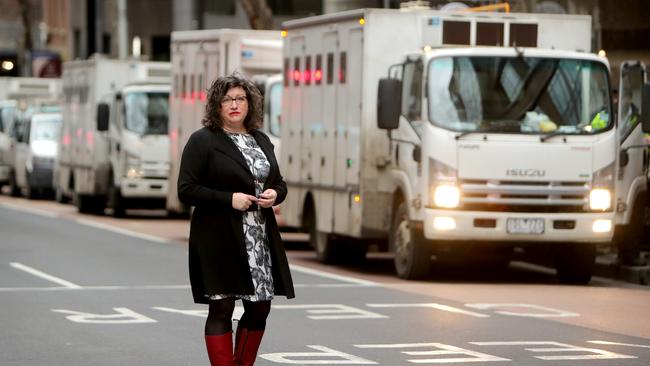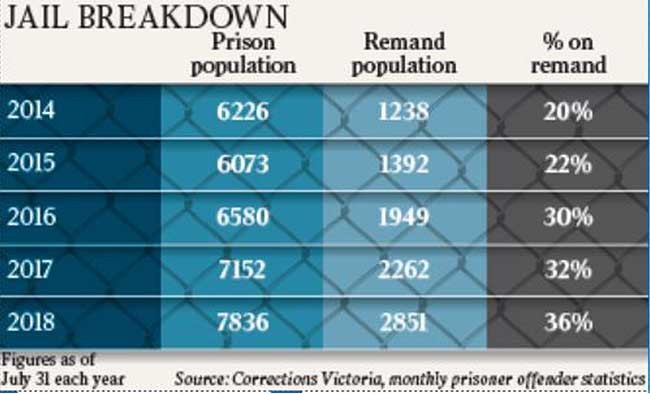Victoria’s bail laws mean accused can wait up two months in jail for trial
Victoria’s prisons and courts are being overwhelmed by the impact of new bail laws.

Victoria’s prisons and courts are being overwhelmed by the impact of new bail laws that force people charged with minor offences such as shoplifting to spend up to two months in jail awaiting trial.
The number of unsentenced prisoners — those remanded in custody on criminal charges — has leapt 60 per cent since the Bourke Street rampage that prompted an overhaul of bail law.
People facing a string of minor criminal offences are consequently being held to the same standard as accused murderers when applying for bail.
“The pressure it is putting on the system at a number of points is extreme,’’ said Sam Norton, a partner with Victoria’s largest criminal specialist law firm, Stary Norton Halphen. “It is not an overstatement to say the justice system, particularly at the Magistrates Court level, is creaking under the strain.’’
An investigation by The Australian found:
• City jails, remand centres and suburban police and court holding cells at capacity.
• More than two dozen cases adjourned on a single day because the cells beneath the Melbourne Magistrates’ Court could not accommodate more prisoners.
• A 37-year-old mother of five spent 68 days behind bars on remand for stealing a handbag from Myers, only to be released on a good-behaviour bond.
• A homeless man was jailed for stealing a packet of sushi.
• A 12-year-old boy was forced to spend the night in a police cell.
Victorian Legal Aid executive director of criminal law Dan Nicholson said the combination of tougher bail laws and long delays in the court system was putting pressure on people to plead guilty to charges they otherwise would contest. “People who have got no criminal histories are spending time in custody because they are pushed into these higher categories of bail,’’ he said. “We are definitely concerned about the prospect of people pleading to things because it is difficult to get bail.’’

Victorian Law Institute criminal law section co-chairwoman Melinda Walker said the potential impact of minor offenders spending weeks or months in custody was profound.
“Some of these people are losing their accommodation, some of these people are losing their income, they are being tainted and they are losing family support,’’ she said. “They may be assaulted when they are in custody, physically and sexually.’’
In the four years since July 31, 2014, Victoria’s population has increased 9.4 per cent, its total prison population 26 per cent and its remand population 130 per cent.
Victorian Attorney-General Martin Pakula, who commissioned a review of bail laws by retired judge Paul Coghlan QC, was unapologetic about more people being locked up. “We knew these changes would increase the remand population and that people would be remanded for less serious offences, but it is unacceptable for accused offenders to assume they will continue to be granted bail if they continue to reoffend while on bail,’’ he said.
“You are more likely to be remanded now if you are deemed an unacceptable risk, are accused of a serious violent crime or continue to offend after having been granted bail. That is as Justice Coghlan recommended, as the government intended and what the community expects: to make its safety the highest priority.’’
Since the murder of Jill Meagher in 2012, Coalition and Labor state governments have reformed parole, abolished suspended sentences, created an offence of committing an indictable offence while on bail and, most recently, expanded the application of an “exceptional circumstances’’ test once reserved for bail decisions for accused murderers, terrorists and traitors.
If someone is charged with shoplifting and bailed, then caught with a small amount of drugs and bailed, then caught stealing a second time, cascading provisions within the Bail Act trigger the exceptional circumstances test. This is despite it being highly unlikely any of these crimes, if proven, would bring a prison sentence.
In these circumstances, it is easier for a person found guilty of a crime to released from custody than a person accused of the same crime who should have the presumption of innocence.
Mr Norton said the overloading of the corrections system, particularly prisoners on remand, was a “huge problem’’ that would only get worse as Victoria headed into another state election contested on law and order issues.
A Corrections Victoria spokeswoman said more than 2000 prison beds had opened in the past four years and 1200 more would be available in the next four years.


